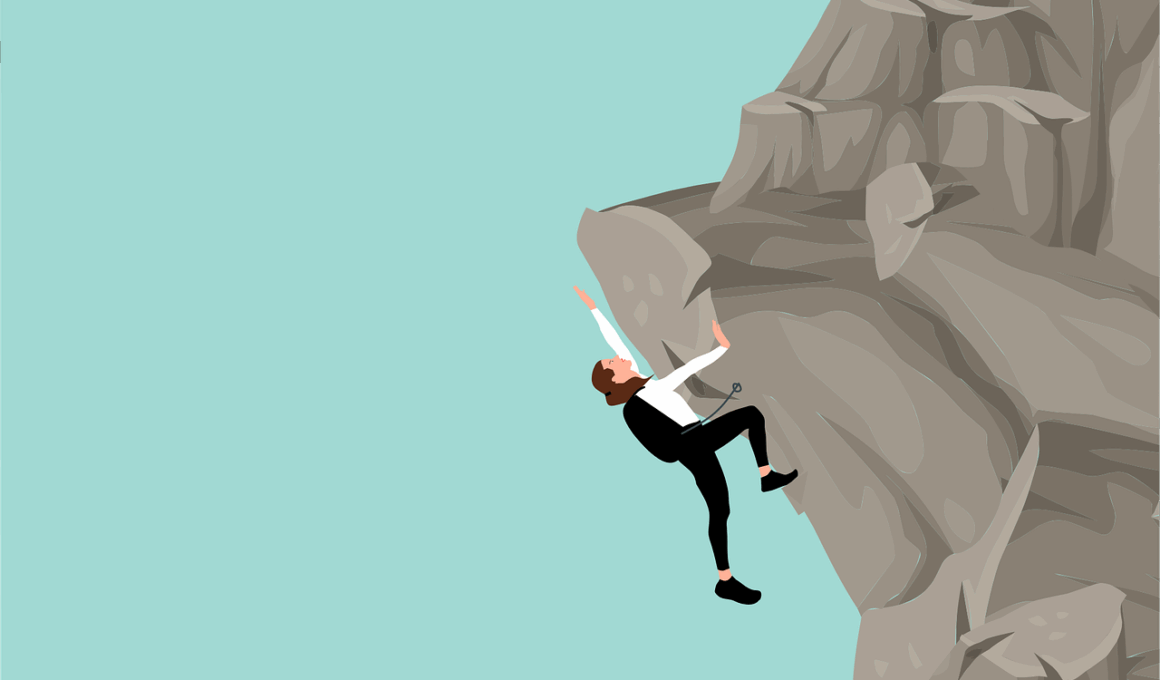Utilizing Peer Learning in Climbing Coaching Sessions
Climbing coaching presents a unique opportunity to integrate peer learning into training sessions. This approach harnesses the collective knowledge and skills of climbers, allowing them to learn from each other. By emphasizing peer learning, coaches can create a collaborative environment where climbers feel empowered to share insights and techniques. In climbing, skills are often developed through trial and error; thus, learning from others’ experiences can significantly accelerate this process. Peer learning can enhance both technical abilities and psychological resilience during complex climbs. Moreover, fostering connections among climbers can improve communication and build trust. Implementing structured peer learning sessions requires careful planning. Coaches must design activities that encourage interaction while addressing individual strengths and weaknesses. These activities include group climbs, skill-sharing workshops, and tandem problem-solving sessions. Additionally, establishing clear objectives ensures that these peer learning opportunities are effective. For example, climbers can pair up and focus on specific techniques such as footwork or body positioning. Ultimately, by fostering an inclusive atmosphere, climbing coaches can significantly enhance the learning experience among their athletes.
Additionally, peer learning promotes a sense of community within climbing programs. When climbers work together, they often build friendships that extend beyond the gym or crag. These relationships can lead to ongoing support and motivation, essential elements for a successful climbing career. Building a strong community fosters an environment where critical feedback is welcomed and celebrated. Climbers are more likely to trust their peers, which facilitates a comfortable space for sharing challenges and celebrating successes. Coaches can facilitate group discussions about past experiences, where climbers reflect on their journey and share valuable insights. Such conversations can lead to collaborative goal-setting, ensuring that everyone feels invested in each other’s progress. Furthermore, peer learning reinforces accountability among climbers, as they feel responsible for their teammate’s improvement, encouraging commitment to training. Group sessions can also highlight diverse perspectives on climbing strategies, helping athletes to think critically about their approach to routes. Through this, they can explore innovative solutions to problems encountered on the wall or during competitions. Community building and peer learning work hand in hand, creating an enriching environment for personal growth both on and off the rock.
The Role of Coaches in Peer Learning
Despite the emphasis on peer learning, climbing coaches play a pivotal role in guiding the process. Their expertise is crucial in establishing effective peer learning dynamics. Coaches must first assess the skill levels of athletes to pair individuals effectively. By doing so, they can create optimal pairs or small groups, ensuring climbers work with those who challenge and inspire them. Furthermore, coaches can facilitate discussions on climbing techniques and strategies. They can interrupt sessions to provide insights and corrective feedback, ensuring that climbers are on the right track. One effective method is to use video analysis, which can help climbers understand their technique better. Coaches should also encourage climbers to ask questions of each other, fostering a culture of curiosity and open dialogue. For instance, climbers can critique each other’s techniques with constructive feedback, enhancing learning further. Moreover, coaches need to create a safe environment for failure, where climbers feel supported in practicing difficult moves without fear of judgment. This balanced approach preserves the benefits of peer learning while still maintaining the essential coaching guidance needed for skill development.
Implementing peer learning in climbing coaching is most effective through structured interventions. Coaches may introduce specific exercises designed to promote learning through peer interaction. For example, skill-sharing sessions can allow climbers to demonstrate techniques they excel in, offering opportunities for learning and practice. These sessions can vary, focusing on different aspects of climbing such as bouldering, top-rope techniques, or lead climbing. Workshops can also tackle topics like mental toughness, route reading, and navigation, further enriching the climbers’ repertoire. For greater impact, hosting peer-led discussions can facilitate deeper understanding and reflection on skills mastered, keeping accountability high. Climbing simulations in teams may encourage competition and cooperative spirit, where climbers work together towards common goals. Each session should be planned meticulously to ensure clarity and purpose, allowing climbers to maximize learning potential and enjoyment. As climbers engage in various peer-led initiatives, they often become mentors, reinforcing their grasp of knowledge. Ultimately, by integrating peer learning activities successfully, climbing coaches can significantly elevate the quality of their coaching sessions, making climbing more enjoyable and productive for all athletes involved.
Assessing Learning Outcomes
An important aspect of incorporating peer learning in climbing coaching is evaluating the effectiveness of these sessions. Coaches should develop a systematic approach to assess learning outcomes resulting from peer interactions. This process may include setting specific performance indicators based on individual and group goals. For instance, recognizing improvements in technical skills, problem-solving abilities, and emotional resilience can be key indicators of success. Additionally, coaches might use self-assessments and peer evaluations to measure climbers’ perceptions of their progress. Surveys or informal discussions can reveal climbers’ experiences and satisfaction levels with peer learning arrangements. Capturing testimonials and feedback from climbers can be instrumental in refining future sessions. Coaches can also track progress through regular check-ins that give insight into the climbers’ evolving needs. Using this data, they can tailor future activities to be more effective. Furthermore, incorporating data from climbing performance recalls, such as completion of challenging routes or enhanced safety management, provides tangible measurements of progress. This ongoing assessment cycle helps ensure that peer learning continuously evolves and remains a beneficial component of climbing coaching.
Moreover, involving athletes in the evaluation process encourages ownership of their learning journey. Climbers can learn to identify what works for them and communicate this to their peers and coaches. This reflective practice cultivates self-awareness, a crucial characteristic for continuous improvement in climbing. Some climbers may find it beneficial to keep performance journals documenting their challenges and victories during peer learning sessions. Journals can help track each climber’s mental and emotional journey, as well as insights gained from their peers. By participating actively in the evaluation process, climbers become more invested in their growth, making them more likely to embrace the peer learning model. Such dynamic interactions enrich the experience in the climbing community, echoing benefits beyond technical skills. The camaraderie built through collaborative efforts and shared learning not only elevates individual climber performance but also fosters a supportive culture. Engaging the community in evaluation establishes a sustainable peer learning environment where members cultivate curiosity and develop strong partnerships. Fostering rapport among climbers often leads to lifelong friends and climbing partners.
Challenges and Solutions
While peer learning showcases many benefits, climbing coaches might face challenges in its implementation. It is crucial to recognize these obstacles to create effective solutions. One challenge is ensuring balanced skill levels among climbers during peer interactions. Coaches should carefully assess athletes’ abilities and strategically pair them. Providing initial guidance on what climbs partners can undertake together can ease potential friction. Additionally, groups may struggle with maintaining focus, potentially leading to disengagement. To counter this, coaches can introduce time-limited tasks where partners work on short exercises aimed at specific techniques. Offering periodic progress updates can keep the energy levels high during sessions. Another common issue is the fear of judgment or ridicule among peers, which can hinder open communication. To create a safe environment, coaches must emphasize respect and support. Guidelines on constructive criticism should also be established, focusing on encouragement rather than negativity. By addressing these challenges with thoughtful solutions, climbing coaches can ensure that peer learning becomes a positive, enriching aspect of climbing training. Ultimately, overcoming these hurdles paves the way for a well-rounded climbing coaching experience, facilitating personal growth and community building.
As peer learning grows integrated into climbing coaching sessions, its impact becomes increasingly evident. The approach nurtures climbers’ technical skills, mental fortitude, and emotional resilience, fostering a comprehensive growth model. The engagement produced through peer learning enables climbers to feel more connected to each other, their coaches, and the climbing community. By embracing such collaboration, climbing coaches can create enriching environments conducive to extraordinary accomplishments. Additionally, peer learning can promote a shared responsibility in the climbing journey, further solidifying teamwork and partnerships among climbers. Coaches can cultivate a ladder of progression whereby climbers who master techniques can help others, ensuring that every participant becomes both a learner and a teacher. This symbiotic relationship enhances personal satisfaction while fostering collective success within coaching programs. Furthermore, as climbers advance in their abilities, they often inspire one another, transforming the group dynamic positively. Integrating peer learning creates a rich atmosphere that contributes not just to individual athletes, but also to the development of a supportive climbing culture. Thus, the potential of climbing coaching significantly expands, forging bonds that echo throughout the journeys undertaken in the climbing community.


